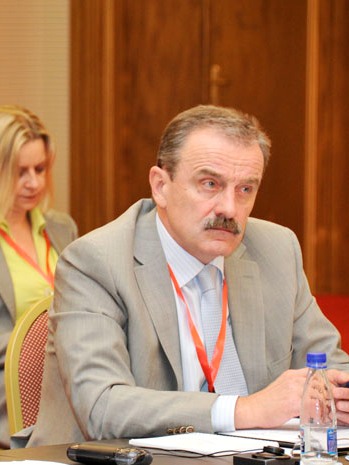News archive - RCC newsletter: "Time is Ripe to Pool Around Large-Scale Regional Projects" - by Hido Biscevic, RCC Secretary General
In the newsletter 14/2011 - In focus of the Regional Cooperation Council, Mr. Hido Biscevic, RCC Secretary General outlines the RCC perspective on the future of regional cooperation - is the glass half empty or half full?
"One of the problems with South East Europe (SEE) is that, with so many contrasting issues, it is sometimes hard to grasp the true perspective. Take the economy, for example – some countries bounced back from the recession, some are even riding high on the crest of a high growth rate, others are facing difficult fiscal adjustments changing inherited social patterns... So, what is the state of play in South East Europe's economy? Take the institutional advancement towards the European Union (EU) as a goal shared by all countries from the region. Apart from those already in the club, next membership is around the corner for one country. Others are hoping for good news this autumn, while some are lagging behind burdened by domestic issues. What is the state of play of SEE advancement towards the EU? Take the bilaterals – some issues have been adjusted and put aside, some are being stirred towards pragmatics, others are still open. So, what is the state of play with bilateral relations in SEE? And one could list down a number of similar, contrasting assessments, all leading to a simple yet important notion – how to grasp a true perspective in such a contrasting environment?
That was, I believe, a challenge for all presidents, prime ministers and ministers as they were preparing for the Summit of the South-East European Cooperation Process (SEECP) and the Regional Cooperation Council (RCC) Annual Meeting that took place in Montenegro a couple of weeks ago. How to assess the situation in the region – is the glass half empty or half full? The importance of this overall assessment could not be underestimated – it could give an impetus to continue and pursue further advancements or could give way to lethargy and stagnation.
But, regardless of contrasts, it is evident that the region continues to sustain a positive momentum. Yes, there are still a number of serious issues to be resolved. Yes, there are still cumbersome inconsistencies. Yes, positive trends still need to be transformed into fully consolidated and irreversibly consistent policies. But, there is no doubt that, in general, the region is on the positive move, advancing and gradually moving away from the past, reducing the number of contrasting issues.
That was also the overall tone heard throughout the Summit and the RCC Annual meetings.
From the RCC standpoint, that was extremely important. Against the backdrop of growing rapprochement, reconciliation, moderation and pragmatism it is much easier for the RCC to deliver then it would have been the case in different circumstances. In addition, when the region is exhibiting genuine efforts to improve, it is much easier for the EU and its institutions to deliver themselves, namely throughout the persistent enlargement policy, as it was proved precisely over the last period. Positive winds coming from both ends are, certainly, good winds for the RCC to deliver also. Yes, there are contrasts, but taking a positive outlook by itself helps to overcome hurdles.
And, indeed, we delivered. Endorsement and adoption of my Annual Report on regional cooperation in South East Europe certainly proved that our members recognized the consistent and continued efforts of the RCC to work assiduously on the implementation of the Strategy and Work Programme in the first year of its 2011-2013 time span. But, more than a formal adoption, it was evident that in all priority areas of our work there is a verifiable advancement. Justice and home affairs cooperation reached a new level; security cooperation is on an advance practically unimaginable until very recently, cultural cooperation is taking momentum, just as the cooperation in sectors like education, aviation and so many others.
Our firm intention is to continue and build upon the work done so far. Thus, the RCC will continue to contribute to reduce the number of contrasts in the region and increase the number of positives. The support to our work was encouraging.
But, I was also encouraged by somewhat new tone of practical pragmatism heard during the Summit. As if indicating that the region has moved from the initial period of the SEECP inception and even from the recent period of routine political confirmations of the will to cooperate onto a new level where cooperation is now seen as a tool for addressing concrete pragmatic and practical development needs shared by our countries, the Summit on St. Stefan opened new windows of opportunity for the SEECP and for the RCC as its operational arm. As if heads of state and government were united around one simple message: let's work together to alleviate the long-standing and current economic and social needs of our countries. It goes without saying that there is a growing recognition that positive political developments in the region, including the EU advancement, must be complemented by joint efforts to devise the most suitable “chargers” of regional recovery and development, in particular in the areas of infrastructure, energy and transportation. Indeed, the time is ripe to pool around trans-regional projects in these sectors.
The RCC will continue to pursue this notion. With support of the Serbian SEECP Chairmanship-in-Office we will work to flagship this approach, whilst continuing also with vigorous implementation of the Strategy and Work Programme 2011-2013. Last, but certainly not least, the RCC role in the implementation of the EU’s Europe 2020 Strategy will mark the third strategic pillar for the RCC in the period ahead."

- Western Balkans
Entry created by Elke Dall on July 14, 2011
Modified on July 14, 2011
